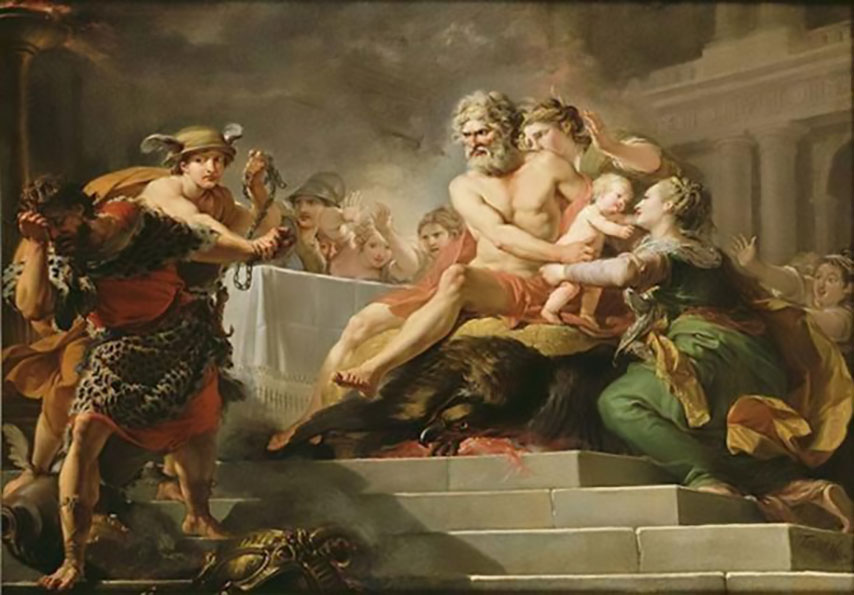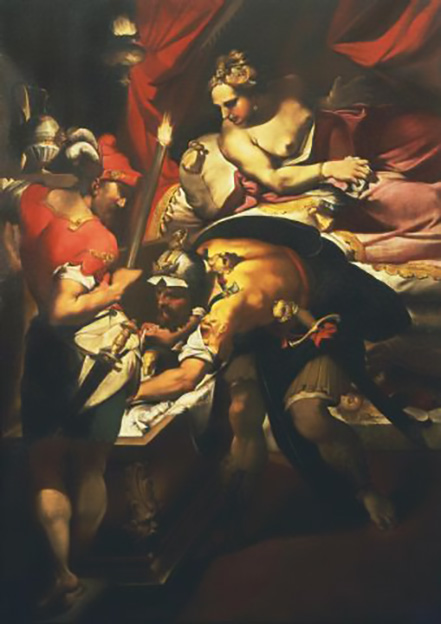Thyestes
In Greek mythology, Thyestes (Ancient Greek: Θυέστης) was a king of Olympia. Thyestes and his brother, Atreus, were exiled by their father for having murdered their half-brother, Chrysippus, in their desire for the throne of Olympia.
They took refuge in Mycenae, where they ascended the throne upon the absence of King Eurystheus, who was fighting the Heracleidae. Eurystheus had meant for their lordship to be temporary; it became permanent because of his death in conflict.
The most popular representation of Thyestes is that of the play Thyestes by Seneca in 62 AD. This play is one of the originals for the revenge tragedy genre. Although inspired by Greek mythology and legend, Seneca's version is different.
Thyestes was a son of King Pelops and Queen Hippodaemia, and therefore grandson of Tantalus. Tantalus’ actions, including serving up his own son, and brought a curse down upon the family line, a curse exacerbated by the actions of Pelops in gaining the throne of Pisa. Despite the curse though, Pelops had prospered building himself a large kingdom across the Peloponnesus, and also building himself a large family.
Thus, Thyestes had many siblings, including Atreus, Pittheus, Astydaemia, Nicippe and Eurydice, and also a half-brother, Chrysippus.
Thyestes grew up in a privileged position, but soon Thyestes, along with his brother Atreus, were exiled from the kingdom of Pelops.
The reason for the banishment is down to the death of Chrysippus, who just happened to be the favourite son of Pelops. Hippodaemia was worried about the favouritism laid upon Chrysippus, and sought out the assistance of Atreus and Thyestes to do away with their step-brother; although whether they were actually involved in his death is not clear.
Nevertheless Thyestes and Atreus were certainly blamed for Chrysippus’ death, and banished. The pair would find a home in the Mycenaean kingdom of their nephew, Eurystheus, and were provided with land and position there.
Atreus would wed Aerope, the daughter of King Catreus, and she would bear him several children, including Menelaus and Agamemnon. Aerope though would also take herself a lover, Thyestes.
It was occasionally said that Thyestes would father two sons by Aerope, Tantalus and Pleisthenes, but more commonly it was stated that Thyestes was father to two or three unnamed sons, and one daughter Pelopia, by an unnamed woman.
Whilst in Mycenae Atreus started to display foolish tendencies, and when he planned to kill the finest lamb in his flock as a sacrifice to Artemis, he reneged on his promise, for he felt that the golden fleeced sheep he found was too good to sacrifice, and so Atreus gave it to Aerope to hide away. Aerope would promptly give the lamb to her lover Thyestes.
During the time of their residence in Mycenae, King Eurystheus would be killed upon the battlefield, leaving the throne vacant, and an oracle proclaimed that a son of Pelops should be made king.
Atreus now thought he had a perfect way to take the throne, and stated that whichever had a golden fleeced lamb would be king, for surely it was a sign from the gods. Of course Thyestes was in possession of the lamb, and producing it, proclaimed himself king.
The reign of Thyestes though was to be short-lived, for Atreus had the gods on his side, and Hermes visited Atreus with a plan. Subsequently Atreus convinced Thyestes to agree that when the sun moved backwards in the sky, then the throne should pass from brother to brother. Thyestes agreed, considering it an impossibility, but Zeus arranged for it to happen, and so Atreus became king of Mycenae.
Atreus was of course now aware of Aerope’s adultery, and Thyestes was initially banished from the kingdom, whilst Aerope was cast into the sea.
Madness had seemingly overtaken Atreus though, for Atreus decided to punish Thyestes in a manner reminiscent of his grandfather Tantalus. Thyestes was invited to a banquet, where the main course comprised the body parts of Thyestes’ sons; Thyestes only realising what he had consumed when Atreus produced the toes and fingers of the deceased boys.

Thyestes and Pelopia went once again into exile, although father and daughter went their separate ways. Pelopia would find sanctuary in Sicyon, where she obtained a position in the temple of Athena, whilst Thyestes travelled to Delphi to consult the Oracle about he could gain vengeance upon his brother.
The Oracle told Thyestes that if he fathered a son by Pelopia then that son would kill his brother. Thyestes would travel on from Delphi to Sicyon, either knowing that his daughter was there, or else just coincidentally arriving in the same place.
When Thyestes arrived in Sicyon, Pelopia was leading a ritual dance associated with a sacrifice to Athena. Covered in blood from the sacrifice, Pelopia would make her way to the river to wash herself. There, Thyestes, with face hidden, jumped upon his daughter and raped her; although the ancient sources do not always make it clear as to whether Thyestes knew who the woman he was raping was.
As Pelopia was being raped, she had the presence of mind to steal her attacker’s sword, so that she might one day recognise the rapist.
In Mycenae all was not well, and famine had struck the land. An Oracle informed Atreus that the famine could not be lifted unless Thyestes was returned to Mycenae.
Atreus sent spies out across Greece, and he himself went to Sicyon to search for his brother, although Thyestes had long since moved on. Whilst in the court of King Thesprotus, Thyestes espied Pelopia, and not recognising his niece, saw just a potential wife, and Thesprotus willingly gave over Pelopia to his fellow king.
Back in Mycenae Pelopia would eventually give birth to a son, Aegisthus, and Pelopia allowed the king to believe that this boy was his son.
When Aegisthus was grown up, Pelopia, having been unable to identify her attacker, gave the sword, which she had taken from the rapist, to her son.
Alternatively, Pelopia knew exactly who the father of her child was, and when the boy was born, Pelopia abandoned him upon a hillside. Before the child perished though, he was found by a shepherd, who took him to Atreus who then raised him as a third son, alongside Agamemnon and Menelaus.
Eventually, years later, Agamemnon and Menelaus came across Thyestes in Delphi, and returned with their uncle to Mycenae, just as Atreus had ordered. Atreus promptly threw his brother into the palace dungeons, believing that with his brother returned the curse on his kingdom would be lifted.
Atreus though didn’t want his brother left alive and so commanded Aegisthus to kill the prisoner. When Aegisthus unsheathed his sword, Thyestes immediately recognised it, and told his would be executioner that it was his sword. Aegisthus called upon his mother to explain previous events, but when she saw her father in chains, she realised just who had raped her. Pelopia grabbed the sword from Aegisthus and killed herself.
Aegisthus returned to Atreus, who seeing the bloodied sword, believed that his brother had been killed, but Aegisthus instead turned the blade upon the King of Mycenae, killing his uncle. Aegisthus then placed Thyestes onto the throne that he had previously occupied.
Restored to the throne of Mycenae once again, Thyestes would exile his two nephews. Eventually, Agamemnon and Menelaus would find sanctuary in the court of King Tyndareus in Sparta.
Details of this second period of rule of Thyestes are missing, although it might be considered to be but a short period of rule.
Thyestes would lose the throne of Mycenae once again when the exiled Agamemnon and Menelaus returned at the head of Tyndareus’ large Spartan army.
Agamemnon would exile his uncle, and Thyestes would make a new home for himself on the Ionian island of Cythera, and would end his days there; Agamemnon’s failure to deal with Aegisthus, the son of Thyestes, though, would have deadly consequences for the new king of Mycenae.

Legacy
As a token of good will and allegiance, King Tyndareus offered his daughters to Agamemnon and Menelaus as wives, Clytemnestra and Helen respectively.
When Agamemnon left Mycenae for the Trojan War, Aegisthus seduced Agamemnon's wife, Clytemnestra, and the couple plotted to kill her husband upon his return. They succeeded, killing Agamemnon and his new concubine, Cassandra. Clytemnestra and Aegisthus had three children: Aletes, Erigone, and Helen who died as an infant.
Seven or eight years after the death of Agamemnon, Agamemnon's son Orestes returned to Mycenae and, with the help of his cousin Pylades and his sister Electra, killed both their mother, Clytemnestra, and Aegisthus.
Tired of the bloodshed, the gods exonerated Orestes and declared this the end of the curse on the house of Atreus, as described in Aeschylus' play The Eumenides.
However, other stories say that when Aletes and Erigone came of age and became rulers at Mycenae, Orestes returned with an army then killed his half-brother and raped his half-sister, who gave birth to a son, Penthilus.

Sources
Bibliotheca Epitome 2.10-2.15
Hyginus, Fabulae, 85: Chrysippus, 86:Sons of Pelops, 88:Atreus
Aeschylus' Agamemnon
Edgar Allan Poe, The Purloined Letter, 140
Milton, Paradise Lost, book 10, lines 687-691
Greek Legends and Myths
Seneca; Churchill, Caryl. Thyestes. : Nick Hern Books, 2014. Ebook Library.
Seneca, Thyestes













